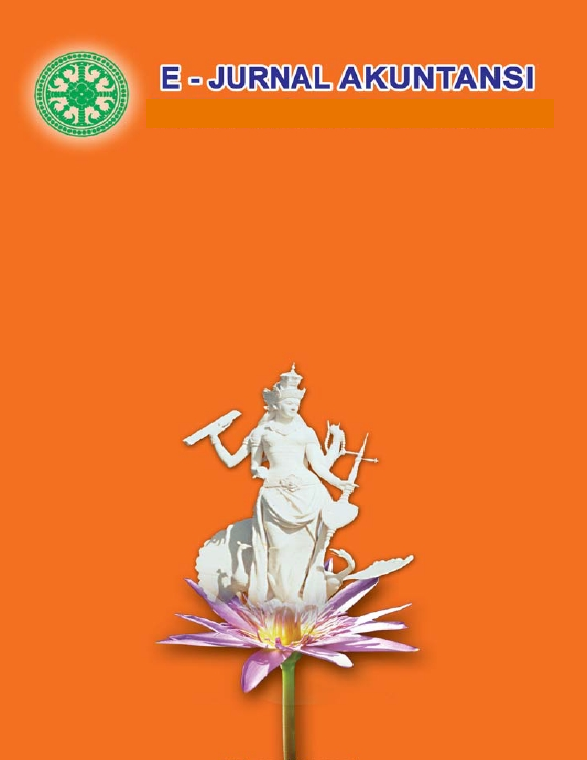Work-Life Balance Memoderasi Equity Sensitivity dan Internal Locus of Control Pada Perilaku Etis Auditor
Abstract
The purpose of the study was to examine and analyze the work-life balance variable moderating equity sensitivity and internal locus of control on the ethical behavior of auditors. The research uses ethical theory as a grand theory. The sample used was 77 auditors. Sampling using purposive sampling as a sampling technique. The analysis technique uses Partial Least Square (PLS). The results showed that work-life balance was able to moderate the effect of equity sensitivity and internal locus of control on the ethical behavior of auditors. Research contributes to the importance of the role of work-life balance in the ethical behavior of auditors.
Keywords: Ethical Behavior; Equity sensitivity, Internal locus of control; Work-life balance; Ethical Theory.
Downloads
References
Ariyanti, N. M. H., & Widanaputra, A. A. G. 2018. Pengaruh Idealisme, Relativisme, dan Etika pada Persepsi Mahasiswa Akuntansi atas Perilaku Etis Akuntan. E-Jurnal Akuntansi, 24, 2197. https://doi.org/10.24843/eja.2018.v24.i03.p21
Berk, C. & Gundogmus, F. 2018. The Effect of Work-Life Balance on Accounting Ethics. 6th International Ofel Conference on Governance, Management and Entrepreneurship. New Business Models and Institutional Entrepreneurs: Leading Disruptive Change. April 13th-14th, 2018, Dubrovnik, Croatia. Zagreb: Governance Research and Development Centre (Ciru).
Chin, W. 2017. Handbook of Partial Least Squares Concept, Methods, and Applications. Molecular Physics (Vol. 115).
Dewi, P. E. D. M., Martadinata, I. P. H., & Diputra, I. B. R. P. 2019. Analisis Hubungan Kecerdasan Emosional Dan Love of Money Terhadap Perilaku Etis Mahasiswa (Studi Empiris Pada Mahasiswa S1 Akuntansi Universitas Pendidikan Ganesha). Jurnal Ilmiah Akuntansi, 3(2), 154–170.
https://doi.org/10.23887/jia.v3i2.16638
Dewi, T. K., & Wirakusuma, M. G. 2018. Pengaruh kecerdasan intelektual, kecerdasan emosional dan kecerdasan spritual pada perilaku etis dengan pengalaman sebagai variabel pemoderas. E-Jurnal Ekonomi Dan Bisnis Universitas Udayana, 9, 2089–2116.
Fisher, G. G., Bulger, C. A., & Smith, C. S. 2009. Beyond Work and Family: A Measure of Work/Nonwork Interference and Enhancement. Journal of Occupational Health Psychology, 14(4):441–456. https://doi.org/10.1037/a0016737
Fithria, D., Aziza, N., & Aprila, N. 2020. Pengaruh Faktor Individu Terhadap Perilaku Tidak Etis Auditor Internal Pemerintah Provinsi Bengkulu. Jurnal Fairness, 10:177–184. https://ejournal.unib.ac.id/index.php/fairness/article/view/15266
Kartika, T. P. D. 2017. Sifat Machiavellian, Orientasi Etis, Equity Sensitiivity Dan Budaya Jawa Terhadap Perilaku Etis Dengan Independensi Sebagai Variabel Intervening. Jurnal Reviu Akuntansi Dan Keuangan, 7(2), 1023. https://doi.org/10.22219/jrak.v7i2.16
Kusuma, R. N. D., & Budisantosa, A. T. 2017. Analisis Pengaruh Equity Sensitivity dan Ethical Sensitivity Terhadap Perilaku Etis Auditor. Modus, Vol. 29(1):105–117.
Laeheem, K. 2020. Causal relationships between religion factors influencing ethical behavior among youth in the three southern border provinces of Thailand. Children and Youth Services Review, 108, 104641.
https://doi.org/10.1016/j.childyouth.2019.104641
Ramantha, I. W. 2017. Tekanan Anggaran Waktu, Locus of Control, Sifat Machiavellian, Pelatihan Auditor Sebagai Anteseden Perilaku Disfungsional Auditor. E-Jurnal Akuntansi, 18(3):2318–2345.
Riyana, R., Mutmainah, K., & Maulidi, R. 2021. Kecerdasan spiritual dan locus of control terhadap perilaku etis mahasiswa akuntansi (Studi kasus pada mahasiswa prodi akuntansi Fakultas Ekonomi dan Bisnis Universitas Sains Al-Qur’an di Wonosobo). Journal of Economic, Business and Engineering, 2(2): 282–291.
Suhakim, A. 2020. Pengaruh Locus of Control, Komitmen Profesi, Kesadaran Etis, Dan Independensi Terhadap Perilaku Auditor. EKOMABIS: Jurnal Ekonomi Manajemen Bisnis, 1(01):91–102. https://doi.org/10.37366/ekomabis.v1i01.10
Suhakim, A. I., & Arisudhana, D. 2017. Pengaruh Gender, Locus of Control, Komitmen Profesi, dan Kesadaran Etis terhadap Perilaku Auditor dalam Situasi Konflik. Jurnal Akuntansi Dan Keuangan, 1(1):38–57.
Titaresmi, K. Y. 2018. Pengaruh equity sensitivity, ethical sensitivity dan gender terhadap perilaku etis mahasiswa akuntansi pada stiesia surabaya. Jurnal Ilmu Dan Riset Akuntansi Sekolah Tinggi Ilmu Ekonomi Indonesia (STIESIA) Surabaya, 7(9):1–18.
Tsui, J. S. L., & Gul, F. A. (1996). Auditors’ Behaviour in an Audit Conflict Situation a Research. Accounting, Organizations and Society, 21(1):41–51.
Wicaksono, F. W. P. (2018). Pengaruh Kecerdasan Emosional, Kecerdasan Spiritual, Gender dan Locus of Control Terhadap Perilaku Etis Mahasiswa Akuntansi. Pengaruh Kecerdasan Emosional, Kecerdasan Spiritual, Gender Dan Locus of Control Terhadap Perilaku Etis Mahasiswa Akuntansi, 113.

This work is licensed under a Creative Commons Attribution-ShareAlike 4.0 International License.



















